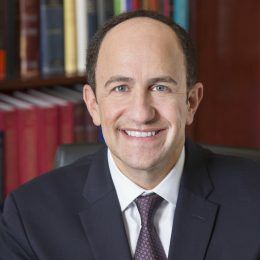Overview

David T. Rubin, MD
Chief, Section of Gastroenterology, Hepatology & Nutrition
Section Chief's Welcome
Welcome to The University of Chicago Section of Gastroenterology, Hepatology and Nutrition’s website. Our program has offered a long history of excellence in clinical care, research and education. Since forming the nation's first full-time department of gastroenterology in 1927, The University of Chicago GI Section has continually improved treatments for digestive tract and related disorders, including inflammatory bowel disease, peptic ulcer disease, swallowing disorders, hepatitis and other liver diseases, pancreatic disease, and nutrition disorders. We currently offer extended and comprehensive clinical and research programs in inflammatory bowel disease, liver disease and transplantation, interventional endoscopy, celiac disease and other nutritional disorders including morbid obesity, pancreatic disorders, and colon cancer surveillance and chemoprevention.
About the Section
The Section of Gastroenterology, Hepatology at The University of Chicago is consistently ranked among the best specialty nationally by U.S News and World Report. With nearly 30 specialists on staff, our program plays a leading role in the understanding of digestive diseases and in developing innovative and successful treatments for patients. Since forming the nation's first full-time department of gastroenterology in 1927, our physicians have continually improved treatments for digestive tract and related disorders by combining medical research, education, and patient care at the highest level.
Research Accomplishments
The Section of Gastroenterology, Hepatology & Nutrition has a long history of basic, translational and clinical research accomplishments. Dating back over 60 years, Drs. Joseph Kirsner and Walter Palmer led clinical research into aspects of acid-related peptic disorders and initiated immunologic research into the underpinnings of inflammatory bowel disease. The University of Chicago performed the first liver transplantations in the city of Chicago and the Section has maintained active research in intestinal cell physiology (including secretory functions and cytoprotection), carcinogenesis and chemoprevention, nutrition (including celiac disease), vitamin D and calcium homeostasis, mucosal immunology and genetics. The identification mechanisms of heat shock protein protection against epithelial cell injury identified by Dr. Eugene Chang exemplify recent basic research accomplishments. Concurrently, clinical research in inflammatory bowel disease led by Dr. David Rubin and colleagues has led to the approval of numerous conventional, immunomodulatory and recent biologic therapies for ulcerative colitis and Crohn’s disease. Dr. Irving Waxman has pioneered endoscopic ultrasound and mucosal resections for identification and treatment of extra luminal and mucosal tumors of the digestive tract. The Section maintains NIH funding for a Digestive Disease Training Center and a Digestive Disease Research Core Center as well as several individual research grants
Education and Training
The multi-faceted academic program offered by the Section of Gastroenterology, Hepatology & Nutrition includes education for medical students, interns, residents, and fellows. Continuing medical education for physicians is also offered in weekly research and clinical conferences as well as multi-specialty conferences focusing on inflammatory bowel disease, endoscopic assessment, liver transplantation, and nutrition. Education within the Section of Gastroenterology consists of instruction at all levels of participation--outpatient clinics, inpatient areas, and laboratories with active student participation. Drs. David Rubin and Dr. Kapuluru Reddy direct the Gastroenterology fellowship training program. Each year 3-4 fellows are accepted into the 3-year training program that has been supported through an NIH training grant for 17 years. Trainees are exposed to a wide spectrum of clinical gastroenterology and have a variety of basic, translational or bench research options to pursue. The GI fellowship training program at The University of Chicago is committed to train young physicians for careers that emphasize digestive disease investigation in order to prepare them for academic research careers. Fourth year, 3rd tier, specialty training is currently offered in inflammatory bowel disease, liver transplantation, nutrition, and therapeutic endoscopy. For information on our Goldgraber Fellowship Program, click here
Patient Care
The faculty of the Section of Gastroenterology, Hepatology & Nutrition treat patients with digestive tract and related disorders including inflammatory bowel disease, swallowing disorders, peptic disease, hepatitis and other liver diseases (including liver transplantation), pancreatic disease, celiac disease and other nutrition disorders, performs screening for colorectal cancer as well as genetic assessments for patients with familial cancers, and diagnoses and treats locally invasive colorectal, esophageal and gastric malignancies via mucosal resection. The Section maintains a busy outpatient practice in the DCAM and a state-of-the-art procedure in the new Center for Care and Discovery unit that annually sees 13,100 patients and performs 13,800 procedures. In addition, the Section manages an inpatient service and a general consultation service as well as focused liver and nutrition consultation services.